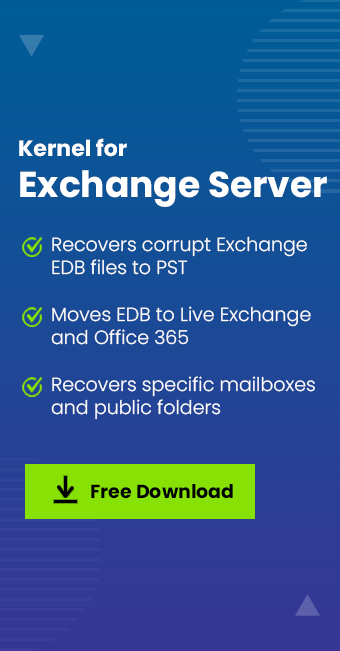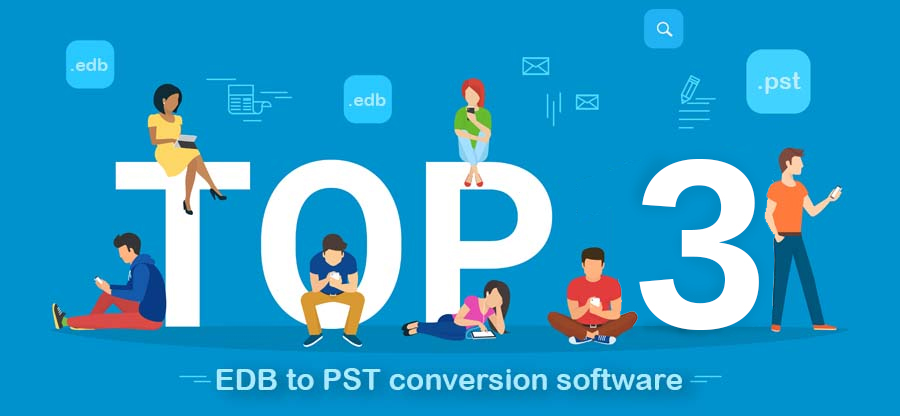Read time 3 minutes
Microsoft Exchange Server has been a champion of email and calendar services for a business. It has a maximum market share compared to other professional servers, and Microsoft constantly update and introduce newer features for better control, security, and management.
Additionally, the previous decade has seen the emergence of several cloud-based platforms. However, Microsoft has been offering the most advanced cloud services in its Office 365 plans. There are home, student, business, and enterprise versions, provided by various cloud applications. Office 365 is a suite that has covered Exchange along with several other cloud services like SharePoint Online, MS Office, Access, OneNote, Skype for Business, and many others.
If you are in a dilemma about which platform is better and suitable for your organization, here is a detailed list of features, pros, and cons of both platforms. This will help you decide which one is better for your organization.
Understand the requirements of your business
You can choose Exchange Server on-premises or Office 365 as both platforms are from Microsoft. But, before making your selection, you need to understand the requirements of your business. So, several factors consolidated can give you the answer to which Exchange Server will be the best for your business. Check out the list of questions you should ask yourself before selecting the Exchange platform:
- What is the total cost for managing the on-site resources?
- What type of business does your organization run?
- What is the total expenditure on hardware and software resources?
- What kind of benefits will Exchange Server on-premises or Online give?
- How long do you need the application?
Exchange Server (On-premises)
Exchange Server (on-premises) is available for purchase with client access licenses. You only need to deploy sufficient hardware and install Exchange Server and clients as per your needs.
- The organization has total authority over the hardware and software of the Exchange. You can easily configure the specifications or settings and manage the mailboxes and mail flow.
- You have total control over system updates, backup, and restoration of the data. The on-premises environment enhances the quality of data management.
- You can integrate many other business applications with the Exchange Server.
- You can archive the emails at the desired location and use advanced search facilities.
- You can easily upgrade your security plans.
- Due to the proximity of the Server, the throughput and access time for the mailbox is quite high. Any bad network connection can be easily fixed.
- The Public Folder provides the access of a single mailbox to multiple users. It makes the storage efficient.
- Offers high-security and multi-level control and management.
- Durability, accessibility, and maintainability of on-premises mailboxes is almost 100%.
- It is easy to meet organizational and regulatory compliances.
- Maintenance and upgrade of the hardware and software are expensive.
- An on-site Exchange administrator is required for managing the mailboxes, stopping unauthorized access, and recovering deleted/corrupt mailboxes.
- The initial installation requires a high investment.
- To implement an Exchange Server, you need expertise in multiple IT skills like DNS Services, firewalls, and Active Directory.
Microsoft 365 (Office 365)
Office 365 or Microsoft 365 is a subscription-based cloud platform from Microsoft. You can subscribe to any of the offered plans based on your needs. Office 365 is available in a range of plans including Office 365 Home, Office 365 Personal, and Office 365 Education.
- You can get many essential services like Exchange Server, Skype for Business, OneDrive for Business, SharePoint, Skype, etc.
- All the facilities are available instantly.
- You do not need to pay for any updates.
- Microsoft does all the hardware and software updates at their end, and it does not affect the business performance.
- Cloud platform reduces your on-site expenditures, which you can invest in other resources.
- Offers accessibility from anywhere (any device or any location).
- You are unaware of the location of your data. Microsoft has data centers in different parts of the globe, and you are completely unaware of the location of your data.
- Manual data migration requires third-party assistance and is quite time-consuming.
- Integration with the on-premises applications is challenging.
- There are no proper archiving abilities in Office 365.
- Meeting organizational and regulatory compliances will be difficult, at least in some geographical locations.
Can professional tools help you overcome the limitations of Exchange/Office 365?
As you have seen, both Exchange and Office 365 come with many advantages and limitations. How to overcome the limitations after you have chosen a platform? The answer is simple – use third-party tools that support specific requirements. We have many professional solutions that help you perform Exchange or Office 365-related tasks such as export/import folders, recover damaged mailbox data, migrate/upgrade versions, very efficiently and accurately.
Kernel Migrator for Exchange helps you perform quick Exchange and Office 365 migrations without any data loss. Similarly, Kernel for Exchange Server helps you perform Exchange database recovery and small-scale migrations. With Kernel Office 365 Backup tool, you can backup Exchange/Office 365 data without errors. All these tools help you overcome the limitations of your email management tools and perform your team communication as well as collaboration proficiently.
Final words
When you compare both the platforms (Exchange Server and Office 365), it would be quite hard to find which one is better. The choice completely depends on your business needs and objectives. The KernelApps offer a spectrum of tools to meet the requirements of Exchange and Office 365 users. The tools allow users to recover corrupt Exchange databases, migrate to different platforms, and back up data.







